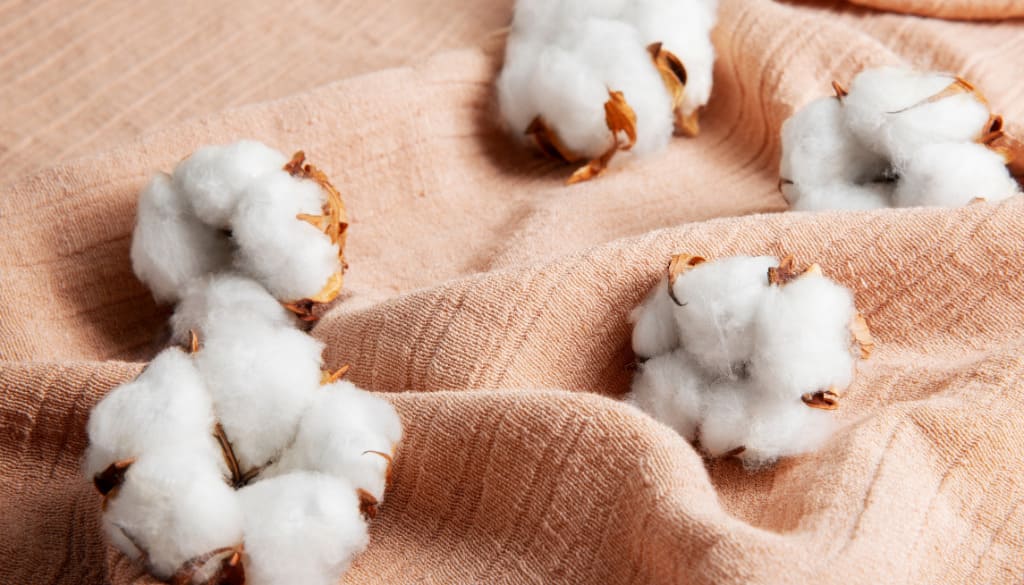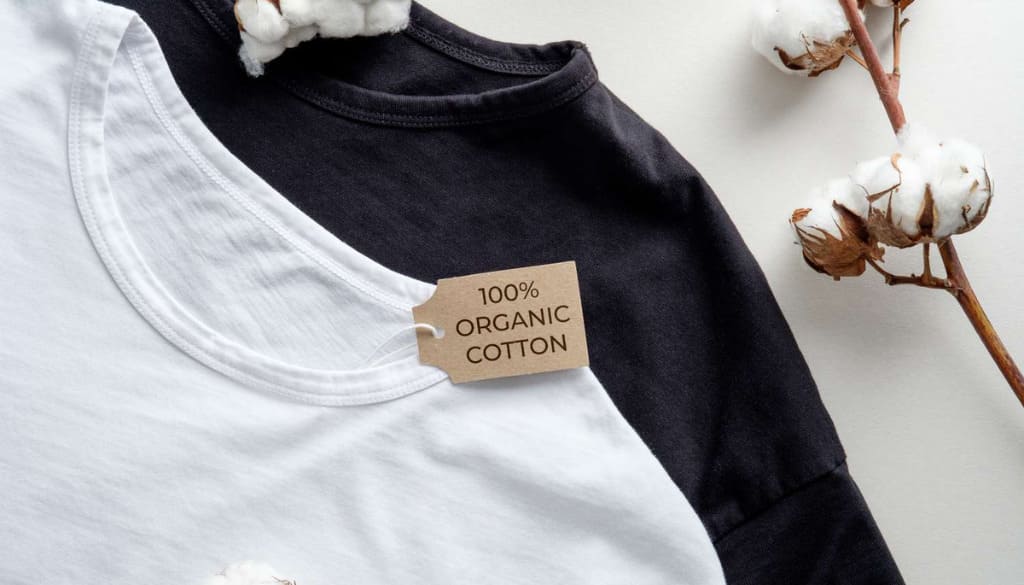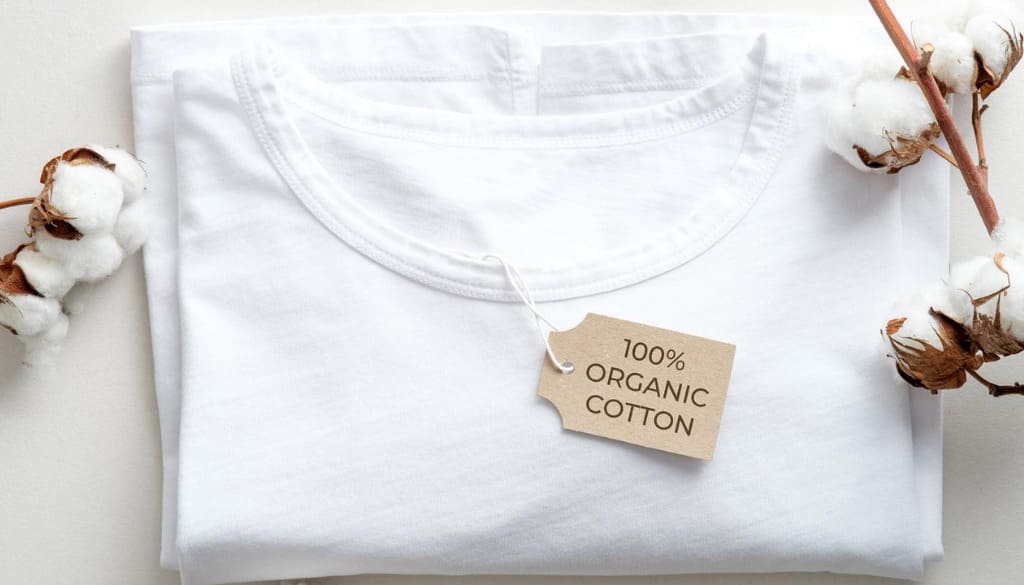In a market where consumers are increasingly concerned about sustainability and eco-friendliness, fashion products made from organic cotton are emerging as a global trend. In the print-on-demand (POD) industry in particular, embracing this trend not only offers a competitive advantage but also contributes to building a responsible brand image. This article will help sellers understand organic cotton t-shirts, distinguish it from conventional cotton, and leverage this trend to create best-selling, eco-friendly products.
What Is Organic Cotton?

Organic cotton is cotton fiber grown using organic farming methods. This means the cultivation process avoids all harmful chemicals such as pesticides, herbicides, chemical fertilizers, and genetically modified seeds (GMO). Instead, farmers use natural methods to protect crops and enhance soil fertility.
Key characteristics of organic cotton include:
- No synthetic chemicals: The entire process from planting and harvesting to fabric processing is safe for the environment.
- Water efficiency: Compared to conventional cotton, organic cotton significantly reduces water usage in cultivation.
To be labeled as “organic” and sold in international markets, a product must meet strict standards set by reputable organizations. Some of the most recognized certifications include:
- GOTS (Global Organic Textile Standard): The world’s leading standard for organic textiles. This certification not only ensures the cotton is grown organically but also monitors the entire supply chain, from harvesting, fiber production, weaving, and printing to the packaging of the final product. GOTS also includes social responsibility requirements, ensuring fair and safe working conditions for workers.
- OCS (Organic Content Standard): This standard verifies and tracks the amount of organic cotton in a textile product. There are two levels: OCS 100 (products containing 95–100% organic cotton) and OCS Blended (products containing 5–95% organic cotton).
The emergence of organic cotton marks not only a leap in product quality but also a green revolution in agriculture. By eliminating chemicals, organic cotton protects farmers’ health, maintains soil fertility, prevents water pollution, and safeguards consumer health, forming the foundation of a truly sustainable agricultural ecosystem.
Advantages of Organic Cotton T-Shirts
When you choose to sell organic cotton t-shirts, you’re not just offering a product, you’re selling a sustainable value. The following advantages are why these shirts are increasingly favored by customers and is one of the best t-shirt fot printing. Choosing organic cotton t-shirts brings multiple benefits, not only for the wearer but also for the environment and society as a whole.

For the Wearer
- Safe for the skin: This is the top advantage. Since no pesticides, chemical fertilizers, or harmful dyes are used, organic cotton t-shirts minimize the risk of skin irritation and allergic reactions. They are especially suitable for people with sensitive skin, children, or those with skin conditions, allowing you to confidently market them to a wide range of customers.
- Exceptional softness and breathability: Organic cotton fibers are generally softer because they undergo less harsh chemical processing. This helps the fabric retain its natural softness, absorb sweat efficiently, and remain highly breathable, providing maximum comfort, especially in hot and humid weather.
- Greater durability: Surprisingly, the absence of harsh chemicals during cultivation and production helps organic cotton fibers maintain their natural structure and inherent strength. As a result, organic cotton t-shirts often hold their shape and color better after many washes.
- No unpleasant chemical odor: Some conventional cotton fabrics may retain chemical odors from the production process. Organic cotton t-shirts typically don’t have this issue, offering a more pleasant wearing experience.
For the Environment
- Protects soil and water resources: Organic farming avoids harmful chemicals, preventing soil and groundwater contamination. This helps safeguard natural ecosystems, maintain biodiversity, and keep water sources clean for communities.
- Reduces greenhouse gas emissions: By eliminating chemical fertilizers (a major source of nitrous oxide, an extremely potent greenhouse gas) and using lower-energy production processes, organic cotton cultivation significantly reduces carbon emissions compared to conventional cotton.
- Saves water: While cotton is generally water-intensive, organic farming focuses on improving soil health, enabling the soil to retain moisture better and reducing irrigation needs. Some studies suggest that organic cotton can save up to 91% of water compared to conventional cotton, thanks to enhanced soil quality.
- Preserves biodiversity: Avoiding chemicals and GMOs helps maintain ecological balance, protecting beneficial insects, birds, and other wildlife that are vital to the natural environment.
- Minimizes chemical waste: The entire production process—from farm to factory, limits the use and release of toxic chemicals, contributing to a cleaner supply chain.
For Society
- Protects the health of farmers and workers: Those directly involved in growing and producing organic cotton are not exposed to harmful chemicals, reducing the risk of chemical-related illnesses and improving their quality of life.
- Promotes sustainable local economies: Organic farming is often carried out by smaller farms, helping stimulate local economies and create sustainable employment for communities.
- Raises community awareness: Choosing and selling organic products helps spread the message of responsible consumption, inspiring more people to join efforts in protecting the environment.
Comparison: Organic Cotton T-Shirts vs. Conventional Cotton T-Shirts
To clearly see the difference, let’s compare organic cotton t-shirts with conventional cotton t-shirts.
|
Criteria |
Conventional Cotton |
Organic Cotton |
|
Farming process |
Uses chemicals |
No chemicals, natural cultivation |
|
Environmental impact |
Causes soil, water, and air pollution |
Eco-friendly and supports ecosystem health |
|
Skin safety |
May cause irritation |
Very safe and gentle |
|
Product durability |
Prone to stretching and pilling over time |
Colorfast, retains shape well |
|
Production cost |
Lower |
Higher due to more complex farming methods |
|
Selling price |
Cheaper, competes on price |
Higher, competes on value |
|
Brand impact |
Neutral |
Positive, enhances “green” brand image |
How to Identify High-Quality Organic Cotton T-Shirts
As a POD seller, choosing high-quality products is essential. Below are some ways to identify premium organic cotton t-shirts:

Check Labels and Certifications
This is the most important factor. Always look for reputable labels and certifications on the product:
- GOTS (Global Organic Textile Standard): As mentioned earlier, this is the most comprehensive certification, ensuring that the entire process, from farm to finished product, meets strict organic and social standards. GOTS labels typically feature a clear logo and a certification number.
- OCS (Organic Content Standard): This verifies the percentage of organic material in a product (e.g., OCS Blended – contains at least 5% organic material, or OCS 100 – contains 95–100% organic material).
- USDA Organic (for the U.S.) or EU Organic (for the EU): Some raw organic fiber products may carry these agricultural organic certifications.
- Fair Trade Certified: While not specifically about organic status, this certification ensures fair working conditions and fair pricing for farmers and is often associated with sustainable products.
Tip: Don’t hesitate to ask your supplier for proof of these certifications. A trustworthy supplier will be willing to share this information.
Assess Fabric by Look and Feel
- Natural softness: High-quality organic cotton t-shirts usually feel soft, smooth, and non-rough. Because the fibers are not exposed to harsh chemical processing, they retain their natural softness.
- Natural, non-vivid colors: If undyed, organic cotton t-shirts typically have a natural off-white or light beige color. If dyed, the colors tend to appear natural and not overly bright, as organic dyes usually have a more muted palette compared to synthetic dyes.
- Fabric texture: The fibers may appear slightly more “raw” than heavily processed conventional cotton, but this is not a sign of low quality—on the contrary, it reflects the natural, minimally processed nature of the fabric.
- Breathability: Thanks to their natural fiber structure and minimal chemical treatment, organic cotton t-shirts often offer better breathability, keeping the wearer cool and comfortable.
- Shrinkage and colorfastness test: When purchasing, wash a sample shirt to check for shrinkage and color fading. High-quality organic cotton t-shirts generally retain their shape and color well after washing.
Research the Supplier
- Transparency: A reputable supplier will be transparent about the origin of materials, production processes, and the certifications they hold.
- Customer reviews: Read feedback and reviews from previous buyers to get an overall sense of the supplier’s product quality and service.
- Return policy: A clear return policy is also a sign of a professional supplier who is confident in the quality of their products.
Applications of Organic Cotton T-Shirts in the POD Industry
In the POD sector, choosing the right blank t-shirt not only determines product quality but also has a significant impact on user experience and marketing strategy. Organic cotton t-shirts are opening a new path for sellers targeting the premium segment and environmentally conscious customers.

Meeting New Consumer Preferences
Gen Z and Millennials two key customer groups in POD are increasingly focused on values such as eco-friendly, sustainable, and green living.
Including keywords like organic cotton, eco-friendly printing, and sustainable fashion in your product descriptions can help you stand out on platforms like Etsy, Amazon, and Shopify.
Increasing Average Order Value
Organic cotton t-shirts typically offer higher profit margins.
Customers are often willing to pay more for products with humanitarian value and environmental benefits.
Building Long-Term Brand Growth
As the market becomes more price-competitive, brand value becomes a sustainable advantage.
Establishing a “green brand” image can pave the way for expanding into other eco-friendly product lines such as organic cotton tote bags or recycled hoodies.
Supporting Effective Marketing Campaigns
Campaigns built around themes like environmental protection and green living naturally attract more attention and have higher viral potential.
Such messaging allows for deeper storytelling and helps foster emotional connections with consumers.
Organic cotton t-shirts are more than just an eco-friendly material—they represent a lifestyle and a responsible business strategy. In the fiercely competitive POD market, choosing the right blank t-shirt can not only define your product quality but also create a distinctive edge for your brand.
If you’re seeking a unique, sustainable path that aligns with modern consumer trends, organic cotton is an investment worth making. Let your products be not only beautiful but also carry true green value.
Please see more:

